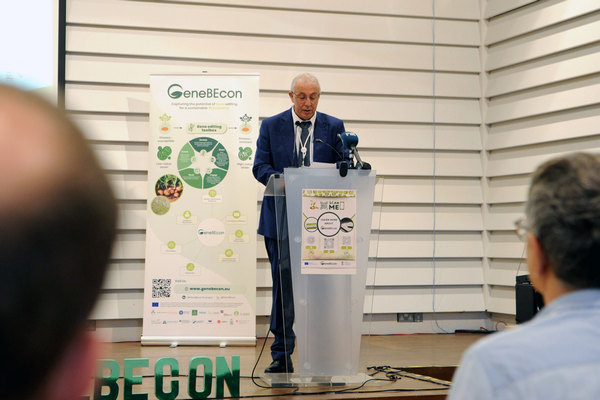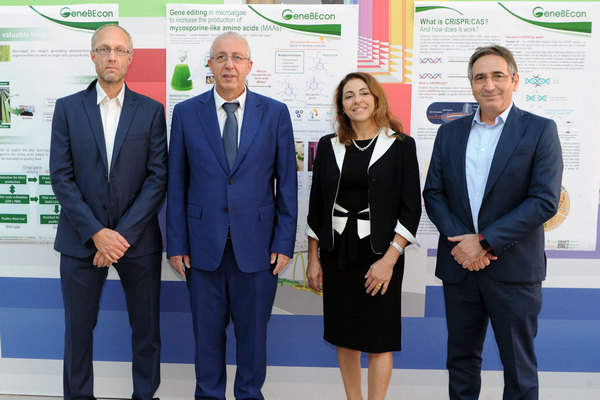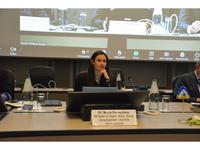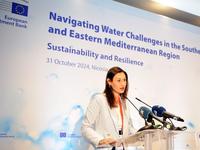Press Releases
06-10-2023 11:04
Keynote speech by the Minister of Agriculture, Rural Development and Environment, Mr Petros Xenophontos, at the Science – Policy Symposium
Cyprus’s agricultural challenges due to climate change and NGTs expectations
It is with great pleasure that I welcome you at the Science – Policy Symposium. The scope of the Symposium is to present the current situation of New Genomic Techniques and their impact on the European Union’s agricultural systems.
During the past few months, we have witnessed extreme events, floods and wildfires throughout the world. These events should make us think. Should make us assess the impact such events can have not only on our security but also on our food supplies. How can we adapt to such events?
At the same time, the importance of agriculture is fundamental for food security and ensuring sustainable and resilient food systems. The successive crises in the agri-food sector make it imperative to seek solutions to increase production. In this context, promoting and creating synergies between green and digital transitions is an ongoing challenge for the European Union and food production. The use of green and digital technologies has the potential to enhance efforts to ensure food security and address climate change.
Agricultural production is under threat due to climate change, and this is more intense in food insecure regions. Various climate-driven extremes, such as drought, heat waves, floods, storms, erratic and intense rainfall patterns, and emerging insect pests have adversely affected the livelihood of the farmers. Future climatic predictions show a significant increase in temperature, and extreme weather events with higher intensity while variability exists in climatic patterns for climate extremes prediction.
According to the models of the Cyprus Institute, mean temperature rises of about 1 to 3°C in the next three decades, of 3 to 5°C by mid-century and 3.5 to 7°C by the end of the century placing Eastern Mediterranean and the Middle East ahead of most other places on the globe in terms of projected temperature changes. To make matters worse, precipitation is expected to decline with reductions in mean annual rainfall of 10-50% in the same region.
Looking at the CyI models for Cyprus in greater detail and especially the period from 2020 to 2050, one of the most striking results is an increase in extremely hot summer days with maximum temperatures exceeding 38˚C for an additional two weeks per year compared to the already quite warm summers we are used to. In addition, it is expected that we will experience warm 'tropical' nights with minimum temperatures above 25˚C for an additional one month compared to current conditions. By the end of the century the number of hot days per year in Lefkosia will increase by two months, resembling conditions currently experienced in cities like Cairo or Bahrain.
Our Ministry has the lead in the implementation of the adaptation strategy to climate change, which is currently under revision to address the new information available from recent research.
To respond to the adverse effects of these scenarios, for agricultural production, there is a need to optimize the climate-smart and resilient agricultural practices and technology for sustainable productivity.
Research and innovation should be at the core of these efforts. Through research, education, and innovation promotion, we can create practices, processes, and products that enhance the resilience of food systems. The utilization of existing practices that have proven to be efficient over time is also important.
We admit that even though Cyprus has always been wary of genetically modified organisms, raising concerns regarding their adequate safety for human and animal health, we now believe, maintaining our initial reservations, that the use of New Genomic Techniques in Agriculture can be beneficial to the EU, if used correctly.
Genomic techniques are being increasingly employed in the food supply chain to address the impacts of climate change. These techniques help in developing more resilient crops and livestock, improving agricultural practices, and ensuring food security in the face of changing climate conditions. Some emerging genomic techniques in the context of food supply to address climate change impacts include but are not restricted to:
Genomic-assisted breeding techniques, such as marker assisted selection (MAS), are used to develop crop varieties that are better adapted to climate change. These varieties can be developed for traits such as drought and heat tolerance, pest resistance, and improved nutrient uptake.
The recently awarded Nobel prize for the genome editing CRISPR-Cas9 technology proved that precision modifications could be performed and the results are impressive. New varieties with selected traits could be designed and produced in short time and released to the farmers when requested.
Coupled with remote sensing and other technologies, genomic data can enable precision agriculture practices. Farmers can use genetic information to optimize planting, irrigation, and fertilizer application, reducing resource wastage and environmental impacts.
Whole genome sequencing can be used to identify genes responsible for disease resistance in plants and animals. This knowledge helps breeders develop disease-resistant plant varieties and livestock, reducing the need for chemical pesticides and antibiotics.
Understanding the genetics of spoilage and decay can lead to the development of crops and foods that stay fresher for longer, reducing food waste.
Genomic information can be integrated with climate models to predict how specific crop varieties will perform under future climate scenarios. This can inform planting decisions and adaptation strategies.
Genomic tools can aid in the conservation of endangered species threatened by climate change. By understanding the genetic diversity within populations, conservationists can make informed decisions about breeding programs and habitat protection.
Genomic research on marine organisms can help us understand how warming oceans and ocean acidification affect marine life. This knowledge can guide conservation efforts and the development of resilient aquaculture practices.
NGTs can be used to design organisms (e.g. algae) that can capture and store carbon more efficiently. These organisms can be deployed in various environments to help mitigate greenhouse gas emissions.
All of the abovementioned, plus many more, techniques can significantly contribute to ensuring a stable and sustainable food supply in the face of climate change challenges. However, ethical, regulatory, and socioeconomic considerations must be addressed to ensure equitable access to these technologies and to mitigate potential risks associated with their use.
While genomic techniques in food supply offer promising solutions to address climate change impacts, they also raise several concerns that need to be carefully considered and addressed. Main concerns associated with the use of genomic techniques in the food supply chain:
Ethical Concerns:
Ownership and Access: There is a concern that the ownership and control of gene-edited crops could be concentrated in the hands of a few large corporations, potentially limiting access for smaller farmers and communities.
Environmental Ethics: Altering the genetic makeup of organisms can have unintended consequences for ecosystems. The release of genetically modified organisms into the environment may lead to ecological disruptions, affecting biodiversity and ecosystem services.
Regulatory Challenges:
Regulatory Frameworks: Developing and implementing appropriate regulatory frameworks for genomic techniques can be challenging. Striking a balance between innovation and safety is crucial but can be difficult to achieve.
Labeling and Transparency: Consumers often want to know whether their food contains genetically modified ingredients. Ensuring accurate labeling and transparency in the supply chain can be complex.
Environmental Concerns:
Unintended Effects: There is a risk of unintended effects when modifying the genetic makeup of organisms. These effects could impact non-target species, disrupt local ecosystems, or lead to the emergence of new pests or diseases.
Gene Flow: Genetically modified crops can crossbreed with wild or organic crops, potentially spreading modified genes into natural populations. This can have ecological and agricultural consequences.
Human Health and Safety:
Allergenicity: The introduction of new genes into crops or foods could potentially lead to the production of allergens that weren't present before.
Unknown Long-Term Effects: Long-term health effects of consuming gene-edited foods are not yet fully understood, and more research is needed in this area.
Social and Economic Concerns:
Economic Disparities: The adoption of genomic techniques in agriculture may exacerbate economic disparities between large-scale commercial farmers who can afford these technologies and small-scale farmers who cannot.
Farmers' Rights: Issues related to farmers' rights to save and replant seeds may arise when genetically modified crops are involved.
Consumer Acceptance:
Consumer Resistance: Some consumers and consumer groups are wary of genetically modified or gene-edited foods due to concerns about safety and ethics. Ensuring consumer acceptance and trust is a significant challenge.
Intellectual Property Rights:
Patent Issues: The patenting of genetically modified organisms and gene-editing technologies can create monopolies and limit innovation. It may also raise questions about the equitable distribution of benefits. Farmers should be able to use the seeds of their own production from the seed derived from new genomic techniques. Additionally, small seed companies should have adequate access to produce new varieties. Also important is the ability to develop varieties that are adapted to local climate conditions in all EU regions so that EU agriculture and farmers remain competitive. The new legislative framework should not jeopardize the resilience and viability of the small farms that are part of the EU's agricultural holdings.
Ecosystem Effects:
Altered Ecosystems: The introduction of genetically modified or gene-edited organisms into ecosystems can lead to changes in species interactions and ecological dynamics, potentially affecting ecosystem health.
To address these concerns, it is crucial to have robust regulatory frameworks, transparent labeling, rigorous risk assessments, and ongoing research to monitor the long-term impacts of genomic techniques in food supply. Additionally, fostering dialogue among stakeholders, including scientists, farmers, policymakers, and consumers, is essential to ensure that the benefits of these technologies are realized while minimizing potential risks.
In conclusion, the EU must ensure that the regulatory framework for New Genomic Techniques is effective and scientifically sound. This will allow new products to be introduced to the market while maintaining the EU's high standards for safety and environmental protection. It is important to invest in research and the development of new technologies and cultivation methods. This will help to improve productivity, quality and safety, and therefore to strengthen the EU's competitiveness in the global market.
I would like to congratulate all the organizers of this important event.
I wish you all a productive symposium.
(MG)
Relevant Press Releases










